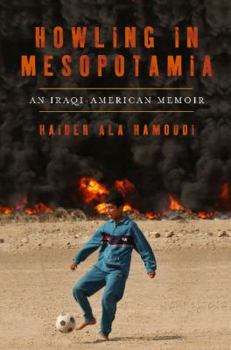Howling in Mesopotamia: An Iraqi-American Memoir
Select Format
Select Condition 
Book Overview
ON JULY 14, 2003, I left Kuwait on a C-130 transport plane bound for Baghdad, the city of my ancestors and a place I had not been for thirteen years. Two nations could legitimately claim me as their... This description may be from another edition of this product.
Format:Hardcover
Language:English
ISBN:0825305489
ISBN13:9780825305481
Release Date:April 2008
Publisher:Beaufort Books
Length:273 Pages
Weight:1.23 lbs.
Dimensions:1.1" x 6.5" x 8.9"
Customer Reviews
4 ratings
The War in Iraq rages on - but the rebuilding has already begun
Published by Thriftbooks.com User , 16 years ago
The War in Iraq rages on - but the rebuilding has already begun. "Howling in Mesopotamia: An Iraqi-American Memoir" is the story of one Haider Ala Hamoudi, one who has dedicated his life and well being to restoring the country he loves. He tells his story of rebuilding and how the events of these past few years have changed his life and the lives of the people around him. A different look at the Iraq conflict, "Howling in Mesopotamia: An Iraqi-American Memoir" is highly recommended to community library current events shelves.
Splendid memoir--honest, charming, intelligent and real
Published by Thriftbooks.com User , 16 years ago
Written with disarming honesty, this memoir of an Iraqi American is a fascinating look at the Iraqi people during the American occupation. Professor Hamoudi returned to the land of his family after the invasion in 2003 with high hopes. As a bilingual lawyer from a prominent Shi'a family, he was in a good position to help with the building of the hoped for democracy. He is obviously a privileged and highly educated man, idealistic and religious but also secular. He hated Saddam Hussein and what the psychopathic dictator had done to his country. But Hamoudi is not just some ex-pat returning to his homeland in other to reap the spoils of war. Instead, as one cannot help but know from reading his engaging account, Hamoudi sincerely believed in the American effort and wanted nothing more than to be an instrumental part of bringing about a secure, happy and prosperous life for Iraqis. In this he failed as he tells us in the final pages. He tells us why candidly. He writes: "...between air conditioning failures, power cuts, limited grocery options, appallingly slow internet connections, a near entire lack of recreation, and, of course, a constant fear of annihilation, life was becoming unbearable, my ability to write limited, and my efforts to teach Iraqi students psychologically exhausting, I felt myself wasting away." (p. 271) Note well the practical and personal nature of his concerns. How easy it would have been--and how empty--for Professor Hamoudi to say he could not achieve success because the American occupation had been so poorly planned and executed, because the uneducated and warring Iraqi fractions were at one another's throats and were not ready for democracy. How easy it would have been to blame others, but characteristically Hamoudi blames himself and accepts personal responsibility for his "failure." But it was not a failure because one of the things that came from his experience was this book. It is a great success itself because it shows the Iraqi people--and especially this particular Iraqi, himself--in a genuinely human way, complete with shortcomings and strengths, complete with differing ideas and beliefs, but with very much the same humanity that we all share. Curiously enough this memoir is also a charming love story that takes the reader by surprise. Here is how Hamoudi recalls the first conversion with his future wife, Sara, whom he met while working in Kurdistan Iraq. "'I am sorry, remind me of your name one more time?' I asked. "She looked confused, but replied, `Sara.' "'Sara, Professor Saman said you were interested in applying for a Fulbright, and I would like to help you. Have you completed the application?' Sara is confused. They are conversing in Arabic, but that is not Sara's native tongue. After some further confusion, Hamoudi asks again, "'Did you not actually apply for the Fulbright? Do I have the wrong person?' "She shook her head from side to side and stared at me, unsure of what I was saying.
Must read
Published by Thriftbooks.com User , 16 years ago
Whether you were for the initial invasion of Iraq, against the initial invasion, for a continuing large military presence in Iraq, against continuing a large military presence, for some type of military presence in Iraq, against any type of military presence, or just not sure, this book is a must read. It gives an account of what it was like, and probably still is like, to be an ordinary person living in Iraq. The author uses superb analogies of American culture to explain Iraqi culture. When reading the book, keep in mind Robert McNamara's rationale for why we lost in Vietnam, in that we did not understand the history and culture of that Southeast Asian nation. History does repeat itself, but never in the same way. This is an intriguing book which is hard to put down.
A great way to understand what's really going on
Published by Thriftbooks.com User , 16 years ago
While we can understand on the surface what's going on in Iraq by reading news accounts, we can't really get the sense, the feel, of what's going on deep inside the country. Reading this book will give you the inside view. Highly recommended. -Susanna K. Hutcheson





